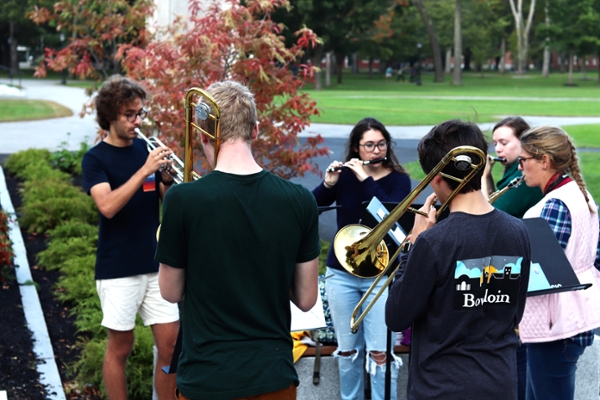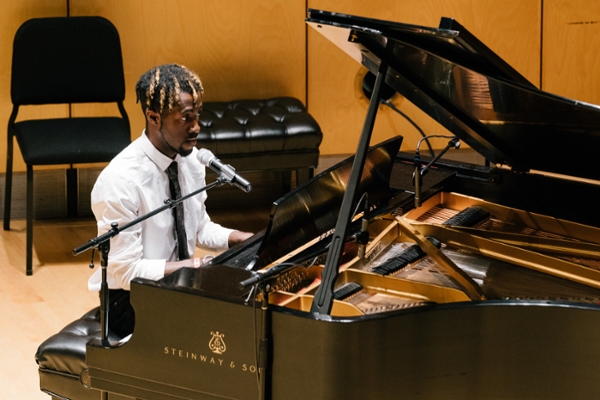Concentrations and Learning Goals
General Concentration
The general concentration allows a music major to fully engage with multiple aspects of the department. Majors with a general concentration are also required to complete a senior project, which may be performance based, composition based, or critical prose.
General music minors will study theory and composition, social and historical context, as well as participate in either a department ensemble or individual performance studies.
Learning Goals
Understand the role of music and sound as a social practice. (Mus 1101, 2101)
Read and write basic Western music notation; Understand diatonic functional harmony. (Mus 1051, 1401)
Perform in an ensemble. (Mus 27xx)
Acquire intermediate-level proficiency in individual instrumental or vocal performance. (Mus 28xx)
Effectively communicate and present on a specific musical topic; organize and research a larger scale project. (Mus 4040)
"I argue for how music can contribute to our understanding of the ways contemporary awareness was shaped and structured."

Social and Historical Context Concentration
Students interested in musicology or music history will critically engage in global perspectives of historical and contemporary music history through seminars and writing. Students may incorporate studies in other departments into this concentration with department approval. Majors are also required to complete a senior project in the form of critical prose.
Learning Goals
Become familiar with a range of musicological methodologies. (Mus 2101)
Understand, read scholarly work on, and articulate persuasive arguments about social, political, and economic aspects of music. (Mus 22xx-23xx, 32xx-33xx)
Effectively organize, research, and present on a specific musicological topic. (Mus 4040)
Theory and Composition Concentration
Students are encouraged to study theory and composition through both a western and non-western lens, with coursework offered in areas such as: tonal analysis, non-western harmony, jazz theory, orchestration, audio recording, and improvisation. Majors are also required to complete a senior composition project.
Learning Goals
Understand concepts in large-scale musical form. (Mus 2401)
Understand instrumental and vocal arrangement, chromatic harmony, basic keyboard harmony, sight-singing, and dictation. (Mus 2403)
Acquire technical facility in instrumental and/or electro-acoustic composition. (Mus 2501, 2551, 3401, 3551)
Compose and present on a large-scale original work. (Mus 4040)


Performance Concentration
Performance students focus their studies on an intensive exploration of the different aspects of music performance. They are required to engage in Bowdoin music ensembles, individual performance studies, as well as theory-based and historical discourse seminars. Majors are also required to complete a senior project in this field.
Performance music minors will study theory and composition, social and historical context, participate in a department ensemble, and take both intermediate and advanced individual performance studies.
Learning Goals
Understand concepts in large-scale musical form. (Mus 2401)
Understand instrumental and vocal arrangement, chromatic harmony, basic keyboard harmony, sight-singing, and dictation. (Mus 2403)
Acquire interpretive and improvisational skills. (Mus 26xx)
Acquire advanced-level proficiency in instrumental or vocal performance. (Mus 38xx)
Prepare, perform, and present on an advanced-level recital. (Mus 4040)
